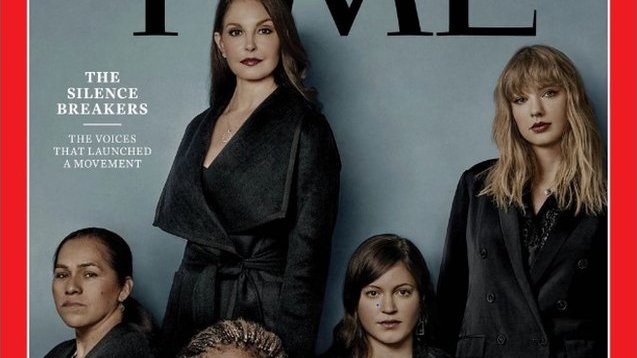
 Image copyright Time
Image copyright Time Time magazine has named “the Silence Breakers” – women who spoke out against sexual abuse and harassment – as its “Person of the Year”.
The movement is most closely associated with the #MeToo hashtag which sprung up as allegations emerged against Hollywood producer Harvey Weinstein.
But Time says the hashtag is “part of the picture, but not all of it”.
“This is the fastest-moving social change we’ve seen in decades,” editor-in-chief Edward Felsenthal said.
He told NBC’s Today programme that it “began with individual acts of courage by hundreds of women – and some men, too – who came forward to tell their own stories”.
The magazine illustrates the ubiquitous nature of sexual harassment by showcasing women from markedly different backgrounds on its cover.
Two celebrities are featured – Ashley Judd, one of the first to speak out against Mr Weinstein, and pop singer Taylor Swift, who won a civil case against an ex-DJ who she said had grabbed her bottom.
They are shown alongside Isabel Pascual, a 42-year-old strawberry picker from Mexico (not her real name); Adama Iwu, a 40-year-old corporate lobbyist in Sacramento; and Susan Fowler, 26, a former Uber engineer whose allegation brought down Uber’s CEO.
But many more people are identified as part of the movement behind the cover shot.
- BBC Trending: How ‘MeToo’ is exposing the scale of sexual abuse
- Why women fear a backlash over #MeToo
This “moment”, the magazine says, “doesn’t have a leader, or a single, unifying tenet. The hashtag #MeToo (swiftly adapted into #BalanceTonPorc, #YoTambien, #Ana_kaman and many others), which to date has provided an umbrella of solidarity for millions of people to come forward with their stories, is part of the picture, but not all of it.
“This reckoning appears to have sprung up overnight. But it has actually been simmering for years, decades, centuries.”
President Donald Trump was named as runner-up. He was given the title last year.
The magazine’s tradition – begun in 1927 as “Man of the Year” – recognises the person who “for better or for worse… has done the most to influence the events of the year”.
The great majority of people selected have been individuals – but by no means all. In 2014, “Ebola fighters” were recognised while in 2011 “The Protester” acknowledged the significance of the so-called Arab Spring.
Note: This story is auto-generated from BBC syndicated feed and has not been edited by AFRICA PRIME NEWS